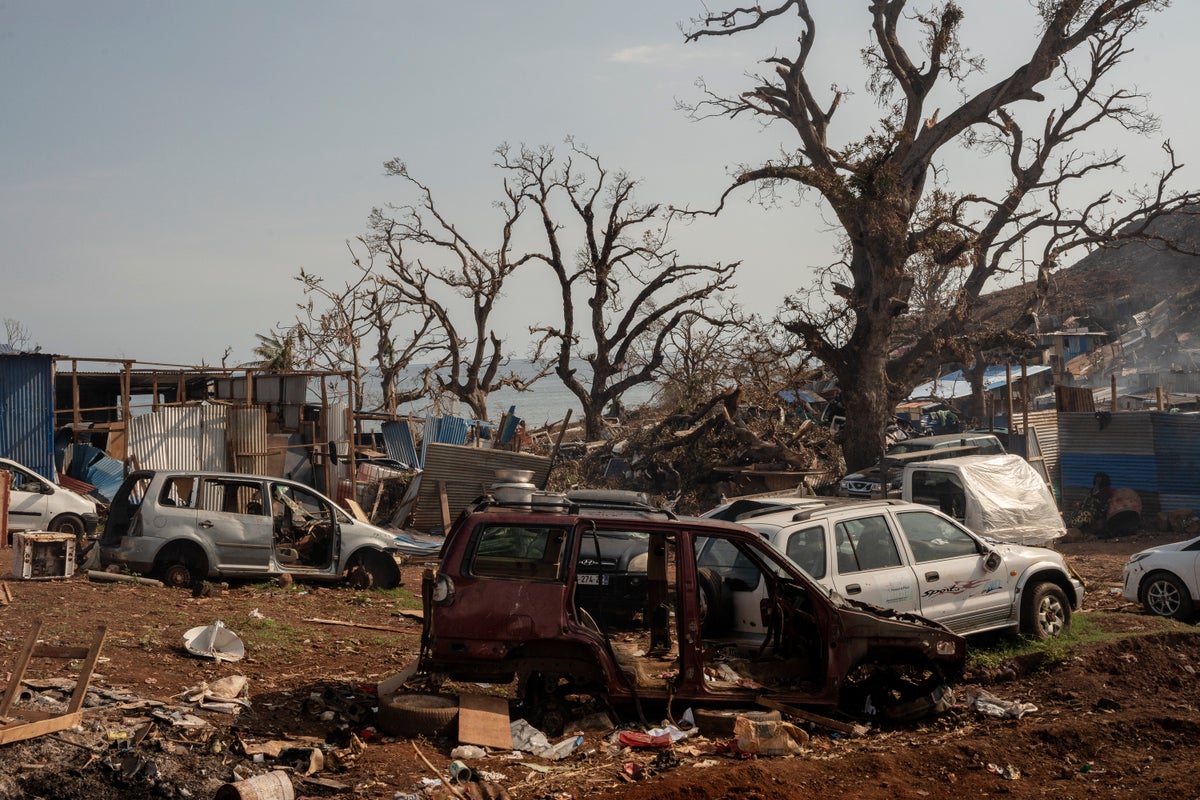
The French territory of Mayotte was battered by a new tropical storm Sunday, just weeks after the worst cyclone to hit the islands in nearly a century laid waste to entire neighborhoods and villages and forced a huge recovery effort by authorities.
Mayotte's people were ordered to stay indoors or find a solid shelter if they didn't have one, and store food and water, as Tropical Storm Dikeledi brought heavy rains and strong winds to once again pound France's poorest department.
Mayotte, an archipelago in the Indian Ocean off the east coast of Africa, had only just begun the process of rebuilding after the devastation of Cyclone Chido last month, which killed at least 39 people, left more than 200 still missing, and injured more than 5,000 when in struck on Dec. 14.
Dikeledi passed over nearby Madagascar as a cyclone on Saturday but had weakened to a tropical storm by the time it reached Mayotte on Sunday, French meteorological service Meteo-France said. The center of the storm would pass about 100 kilometers (62 miles) south of Mayotte, Meteo said. Chido had hit Mayotte head-on.
Meteo-France warned Dikeledi could strengthen into a cyclone again, while authorities in Mayotte said there was a high danger of flooding and landslides and issued a red alert for the islands on Saturday night. That alert would remain in place for Sunday and civilians were forbidden from being outside until the alert was lifted, said the Mayotte Prefecture, the French government department that runs the territory.
“The danger to the population persists,” the prefecture said in a series of alerts on its official Facebook page. It said the weather would be calm at one point on Sunday but would become violent again later in the day.
Mayotte was also again opening cyclone shelters at schools and community centers for those in need, the prefecture said. The international airport, which was heavily damaged by Chido, was closed again until further notice, the prefecture said.
Officials said they were taking no chances after the devastation of Chido, which also prompted an angry reaction by Mayotte residents who vented their frustration at French President Emmanuel Macron when he visited days after the disaster. Mayotte's people have previously accused the French government of neglecting them and the territory, which is the poorest in the European Union.
The French Interior Ministry said more than 4,000 emergency personnel and security forces had been mobilized for Dikeledi's arrival, with much of the focus on the precarious shantytowns around the capital, Mamoudzou, and other areas, which were largely destroyed by Chido.
National TV station Mayotte la 1ère said that the southern village of Mbouini, one of the few in Mayotte spared by Chido, had been flooded and almost totally destroyed by Dikeledi. Mayotte la 1ère broadcast video of the residents of Mbouini escaping in wooden canoes as their homes were submerged under flood water.
Mayotte is a densely populated territory of around 320,000 people. Another 100,000 undocumented migrants from nearby Comoros and elsewhere are also believed to live on the islands, which are a draw for people from poorer countries because of the French welfare system.
Chido was the worst cyclone to hit Mayotte in 90 years, authorities said. While 39 deaths have been confirmed, French Prime Minister François Bayrou warned on a visit to the islands two weeks ago that the final death toll could be several hundred. Authorities have faced challenges in recording the deaths and injuries from Chido because many of those affected were undocumented migrants, and also because of the Muslim practice of burying people within 24 hours of them dying.
After smashing Mayotte, Chido made landfall on mainland Africa, killing more than 100 others in Mozambique and Malawi. Meteorologists expect Dikeledi to turn south and then east, tracking back toward Madagascar and out to sea after passing Mayotte.
November to April is cyclone season in the southwestern Indian Ocean, and the region has been pummeled by a series of strong ones in recent years. The worst was Cyclone Idai in 2019, which killed more than 1,500 people in Madagascar, Mozambique, Malawi and Zimbabwe and affected more than 3 million people.
___
AP Africa news: https://apnews.com/hub/africa







